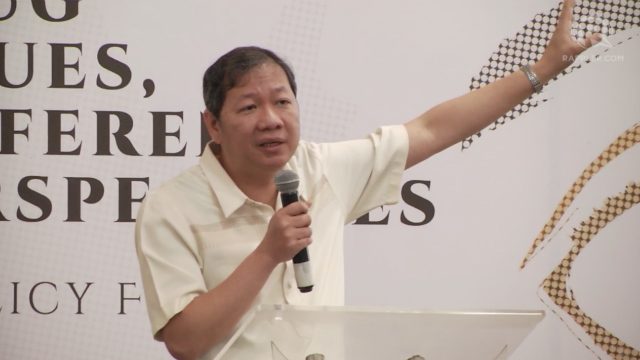SUMMARY
This is AI generated summarization, which may have errors. For context, always refer to the full article.

MANILA, Philippines – Is the death penalty an effective “deterrent” to illegal drugs?
The chair of the government agency tasked to craft strategies and policies on drug prevention and control on Friday, May 5, admitted that they “did not look into the correlation of the drug campaign and the drug penalty” because the data simply doesn’t exist.
“I really cannot say if it’s a deterrent or not,” Dangerous Drugs Board (DDB) chairman Secretary Benjamin Reyes during a drug police forum in the University of the Philippines, Diliman, Quezon City.
At the conference, organized in part by the Free Legal Assistance Group (FLAG), Reyes was quizzed about the current administration’s approach to illegal drugs. He was asked in particular about a proposal to bring back the death penalty, as an effort to punish those involved in the illegal drugs trade. (READ: Death penalty for drug convicts: House passes bill on final reading)
Reyes dodged the question, saying lawmakers should be the ones addressing this. “I’m thankful not to meddle with this very controversial issue,” he said, laughing.
Reyes chairs the DDB, which is composed of 17 different members – including the Philippine National Police, the Philippine Drug Enforcement Agency, and the health department, among others.
Article 9, Section 77 of the law that created the board states that the DDB “shall develop and adopt a comprehensive, integrated, unified and balanced national drug abuse prevention and control strategy. It shall be under the Office of the President.”
Reyes was appointed by Duterte to chair the board.
One of Duterte’s campaign promises last year was the restoration of the death penalty. The House of Representatives has passed a bill on it, but the same faces rough sailing in the Senate.
The Philippines, after all, is a signatory to the International Covenant on Civil and Political Rights and the 2 Optional Protocols, which prohibit the reimposition of the death penalty once the legislation is already revoked. The UN has reminded the Philippine Senate of this ratification.
For human rights?
Responding to more questions from human rights workers, members of non-governmental organizations, and government workers at the conference, Reyes said he would “not agree to any policy that will violate human rights and would neglect health issues.”
He said illegal drugs are both a health and peace and order issue in the country.
The Duterte administration has been praised and ridiculed for its war on drugs.
Also at the same forum, United Nations expert on summary killings Agnes Callamard pushed for a “multi-disciplinary” approach to illegal drugs, reiterating that punitive measures only make the situation worse.
Callamard is in the Philippines for an “academic” visit. – Rappler.com
Add a comment
How does this make you feel?
![[In This Economy] Is the Philippines quietly getting richer?](https://www.rappler.com/tachyon/2024/04/20240426-Philippines-quietly-getting-richer.jpg?resize=257%2C257&crop=194px%2C0px%2C720px%2C720px)
![[In This Economy] A counter-rejoinder in the economic charter change debate](https://www.rappler.com/tachyon/2024/04/TL-counter-rejoinder-apr-20-2024.jpg?resize=257%2C257&crop=267px%2C0px%2C720px%2C720px)
![[Vantage Point] Joey Salceda says 8% GDP growth attainable](https://www.rappler.com/tachyon/2024/04/tl-salceda-gdp-growth-04192024.jpg?resize=257%2C257&crop_strategy=attention)
![[ANALYSIS] A new advocacy in race to financial literacy](https://www.rappler.com/tachyon/2024/04/advocacy-race-financial-literacy-April-19-2024.jpg?resize=257%2C257&crop_strategy=attention)

There are no comments yet. Add your comment to start the conversation.